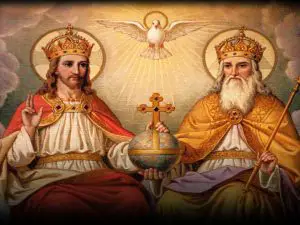As we endeavor to build our lives on the foundation of God’s word, it’s important to know what the Bible says and what it doesn’t say about the Holy Spirit.
We’ve been taught that the Holy Spirit is God, a separate person from God the Father and Jesus the Son, and the third member of a triune being. The Spirit is understood to be co-equal, co-eternal, and co-essential with the Father and the Son. If this is the case, we should find ample evidence of these claims in Scripture. However, when we examine God’s word, we discover that it contradicts current orthodoxy.
Here are ten Biblical truths that should cause us to question what we’ve been taught about the Holy Spirit:
1. We are never instructed to worship the Holy Spirit.
Church creedal statements about God form the foundation of Church orthodoxy. While every church may not recite the creeds, nevertheless, they adhere to the doctrines therein. For example, the Nicene Creed[1] (381 AD) states that the Holy Spirit is to be worshiped:
And we believe in the Holy Spirit, the Lord, the Giver of life, who proceeds from the Father, who in unity with the Father and the Son is worshiped and glorified….”[2] (emphasis added)
 However, the Bible never instructs us to worship the Holy Spirit. Nor are there any examples of saints worshiping the Spirit in Scripture. On the other hand, Jesus said that God the Father is to be worshiped,[3] while Jesus is worshiped for being the Son of God, and the Lamb who, with his blood, purchased men for God.[4] But the Holy Spirit is never worshiped.
However, the Bible never instructs us to worship the Holy Spirit. Nor are there any examples of saints worshiping the Spirit in Scripture. On the other hand, Jesus said that God the Father is to be worshiped,[3] while Jesus is worshiped for being the Son of God, and the Lamb who, with his blood, purchased men for God.[4] But the Holy Spirit is never worshiped.
If God’s word is not the basis for the belief that the Holy Spirit is to be worshiped, where did this doctrine come from? New Testament scholar and professor Larry Hurtado, explains:
But early Christian devotional practice is dyadic in shape, with prayers and devotion addressed to God and to Christ. The Spirit doesn’t function as a stated recipient of devotion in the New Testament or in early Christianity. It isn’t until the fourth century when a Christian council has to debate the question, Should we worship the Spirit? They finally decide yes, but isn’t it interesting it’s in the fourth century before the question even comes up.[5] (emphasis added)
In other words, the doctrine is not one that was passed down from first century followers to each subsequent generation. Rather, it is a post-Biblical doctrine determined by a council that convened roughly 350 years after the founding of the Church.
2. The Bible does not teach us to pray to the Holy Spirit.
That’s right. No one ever prays to the Holy Spirit in the Bible. A strange thing if the Spirit is God. On the other hand, we are told to pray in the Holy Spirit,[6] which some interpret to mean that we are to pray according to God’s will. Others view this as an instruction to pray via the gift of tongues.[7] In addition, we are told that the Spirit helps us when we do not know how we ought to pray, even interceding for us.[8] But contrary to post-Biblical orthodoxy, the Bible never instructs us by command or by example to appeal to the Holy Spirit in prayer. Professor Dale Tuggy, in his book What is the Trinity? writes:
Early on, Christians did not call the Holy Spirit “God,” nor did they worship or pray to the Holy Spirit. Why? Worship and prayer to the Holy Spirit are not found anywhere in the New Testament.[9]
Jesus, however, both instructs and demonstrates that we are to pray to God the Father.[10]
3. No one in the Bible ever gives thanks to the Holy Spirit.
If the Holy Spirit is the third member of a triune God, we would expect “him” to be thanked specifically. But that doesn’t happen. For example, in the New Testament, Paul gives thanks to God, who, for Paul, is only the Father, thirty-seven times. Four of those times, he prays through Jesus or in Jesus’ name, but the object of his thanksgiving is God. On one occasion, the apostle gives thanks to Jesus, whom he addresses as the Christ,[11] but the Holy Spirit is never thanked.
4. The Holy Spirit is never included in any greeting.
In the epistles, we find this common greeting or a variation of it: Grace to you and peace from God our Father, and the Lord Jesus Christ.[12] However, the Holy Spirit is never included in any salutation. A strange and inexplicable omission if the Spirit is indeed a separate person and a member of a triune God.
Some may propose that the book of Revelation offers a greeting from the Holy Spirit:
Revelation 1:4-5 (NASB) John to the seven churches that are in Asia: Grace to you and peace, from Him who is and who was and who is to come, and from the seven Spirits who are before His throne, 5 and from Jesus Christ, the faithful witness, the firstborn of the dead, and the ruler of the kings of the earth. To Him who loves us and released us from our sins by His blood (emphasis added)
It’s important to note that the NASB chose to capitalize the word Spirits, while other translations, such as the NIV, ESV, and HCSB, use the lower case “s.” The use of capitalization, unfortunately, gives the reader the impression that the seven spirits is a person, more specifically, the Holy Spirit. Also, note that the seven spirits are before God’s throne, that is, they do not occupy the throne but are located in front of it. In Scripture, before the throne is the place designated for those who are worshiping God. Moreover, when someone is said to be before the throne of God, it’s an indication that they are at God’s disposal or service. For example, the angels, the twenty-four elders, and the four living creatures all bow down before the throne of God, as does a great multitude from every nation.[13] Are we to believe that the Holy Spirit is before God’s throne worshiping Him? Surely not.
Then who or what are the seven spirits? Some believe it is a reference to the seven angels and the seven churches that are mentioned in Revelation. Still, others think the answer lies in Isaiah’s prophesy, which says that Yahweh’s Spirit will rest upon the coming Messiah:
Isaiah 11:1-2 (NASB) Then a shoot will spring from the stem of Jesse, and a branch from his roots will bear fruit. 2 The Spirit of the LORD [Yahweh] will rest on Him, the spirit of wisdom and understanding, the spirit of counsel and strength, the spirit of knowledge and the fear of the LORD.[14]
In other words, the seven spirits are aspects of God’s anointing, indicating that the coming Messiah will have everything he needs to rule the future kingdom. Since the multiple spirits listed here and in Revelation chapter one are not speaking of the  person of the Holy Spirit, we can safely conclude that the Spirit is never a part of any personal greeting like the Father and the Son routinely are.
person of the Holy Spirit, we can safely conclude that the Spirit is never a part of any personal greeting like the Father and the Son routinely are.
5. The Holy Spirit does not have a proper name.
God the Father’s name is Yahweh. The Son’s name is Jesus. But the Holy Spirit, a supposed third person of the Trinity, does not have a proper name. Some may counter that the name “Yahweh” encompasses all members of the Trinity. However, in the following passage, we see that Jesus is not Yahweh:
Acts 4:26-27 (NASB) ‘THE KINGS OF THE EARTH TOOK THEIR STAND, AND THE RULERS WERE GATHERED TOGETHER AGAINST THE LORD [Yahweh] AND AGAINST HIS CHRIST.’ 27 “For truly in this city there were gathered together against Your holy servant Jesus, whom You anointed, both Herod and Pontius Pilate, along with the Gentiles and the peoples of Israel (emphasis added)
Here, as in other passages, we see that the Messiah is not Yahweh, and Yahweh is not the Messiah. Thus, the name is not indicative of the Trinity, for Jesus is not represented by it.
Some may claim that the Spirit’s name is the Helper or the Spirit of Truth,[15] however, these are only terms that describe function and are not proper names. Therefore, we must ask, how can the Holy Spirit be a separate person if it doesn’t have something as fundamental as a personal name?
6. The Holy Spirit has no throne.
The throne of God the Father is spoken of in Scripture, as is the throne that He delegated to Jesus.[16] Therefore, we would expect that the Holy Spirit, as God and a separate person from the Father and the Son, would have a throne as well. But alas, the Bible never speaks of the Holy Spirit as having a throne. How can a member of the so called godhead not have a throne? This is even more shocking when we consider that lesser beings, such as the twenty-four elders[17] and even Satan, are said to have thrones,[18] but the Holy Spirit does not.
7. The Holy Spirit does nothing on its own authority or initiative.
Jesus did not come of his own will.[19] It was the Father who sent him. What’s more, he only said and did what the Father commanded him. He’s not the only one. The Holy Spirit never comes on its own initiative, but only by the Father’s authorization, via the agency of His Son.
Luke 11:13 (NASB)”…how much more will your heavenly Father give the Holy Spirit to those who ask Him?” (emphasis added)
John 14:26 (NASB) “But the Helper, the Holy Spirit, whom the Father will send in My name… (emphasis added)
John 15:26 (NASB) “When the Helper comes, whom I will send to you from the Father, that is the Spirit of truth who proceeds from the Father… (emphasis added)
Luke 24:49 (NASB) And behold, [Jesus said] I am sending forth the promise of My Father upon you… (emphasis added)
Acts 2:33 (NASB) [Jesus] Therefore having been exalted to the right hand of God, and having received from the Father the promise of the Holy Spirit, He has poured forth this which you both see and hear. (emphasis added)
Furthermore, we never find the Spirit speaking on its own initiative, but always at the Father or the Son’s bidding:
John 16:13 (NASB) “But when He, the Spirit of truth, comes, He will guide you into all the truth; for He will not speak on His own initiative, but whatever He hears, He will speak; and He will disclose to you what is to come. (emphasis added)
In other words, someone is telling the supposed third member of the Trinity what to say. What’s more, the focus of the Spirit’s message is always Jesus.[20] How is it that God doesn’t act or speak on “his” own? Does this sound like God to you?
8. The Holy Spirit is never referred to as the Almighty.
The Athanasian Creed (c. 500 AD)[21] declares the Holy Spirit, along with the Father and the Son, to be the Almighty:
The Father is almighty, the Son is almighty, the Holy Spirit is almighty. Yet there are not three almighty beings; there is but one almighty being.”[22] (emphasis added)
The creed got one thing right: there is only one Almighty. However, Scripture reveals that only God the Father is the Almighty. The Son and Spirit are never referred to as Almighty.
9. The Holy Spirit is not omniscient.
 We’ve often heard that one of God’s attributes is that He is all knowing. While this may be true of the Father, it is not true of Jesus or the Spirit. When speaking about his second coming, Jesus said no one but the Father knew when it would occur:
We’ve often heard that one of God’s attributes is that He is all knowing. While this may be true of the Father, it is not true of Jesus or the Spirit. When speaking about his second coming, Jesus said no one but the Father knew when it would occur:
Matthew 24:36 (NASB) “But of that day and hour no one knows, not even the angels of heaven, nor the Son, but the Father alone. (emphasis added)
The Father alone knows the time of Christ’s return, for it was determined by His authority.[23] Since the Father alone knows, it means, by implication, that Jesus and the Holy Spirit do not.
Some theorize that Jesus does not know the time of his return in his human nature, but he does know in his divine nature. But Scripture does not teach that Jesus has dual natures. What’s more, this excuse cannot be offered on the Holy Spirit’s behalf since, as spirit, “he” would know all things and not be limited by a supposed human nature.
10. The Bible never teaches that the Holy Spirit is God, a separate person, or a member of a supposed Trinity.
The Athanasian Creed (c. 500 AD) states:
Thus the Father is God, the Son is God, the Holy Spirit is God. Yet there are not three gods; there is but one God.[24] (emphasis added)
The Jews were fiercely monotheistic, having been taught for centuries that God is “one,” as evidenced by God’s own statements,[25] as well as the several thousand times He is referenced using singular personal pronouns such as He, His, My, Mine, and I. If God was really a Trinity, the Jews would have required teaching to “correct” their view that the “one God” was actually a “three-in-one” deity. There are numerous Trinitarian scholars that will attest to the fact that there is no such teaching in Scripture. Here are but a few:
The New Catholic Encyclopedia
– The formulation: one God in three Persons was not solidly established, certainly not fully assimilated into Christian life and its profession of faith, prior to the end of the 4th century. But it is precisely this formulation that has first claim to the title THE TRINITARIAN DOGMA. Among the Apostolic Fathers, there had been nothing even remotely approaching such a mentality or perspective.[26] (emphasis added)
The New International Dictionary of New Testament Theology – The NT does not contain the developed doctrine of the Trinity. The Bible lacks the express declaration that the Father, the Son, and the Holy Spirit are of equal essence and therefore in an equal sense God himself… All this underlines the point that primitive Christianity did not have an explicit doctrine of the trinity such as was subsequently elaborated in the creeds of the early church.”[27] (emphasis added)
The New Unger’s Bible Dictionary – That God is alike one person, and in the same sense three Persons, is what Christianity has never professed.[28] (emphasis added)
Neither Jesus nor any of the inspired Biblical authors ever taught that the Holy Spirit was God, a separate person from the Father and the Son, and a third member of a triune being. Never. Instead, the Bible teaches that the Holy Spirit is the Spirit of God the Father as seen, for example, in these parallel passages:
Matthew 10:19-20 (NASB) “But when they hand you over, do not worry about how or what you are to say; for it will be given you in that hour what you are to say. “For it is not you who speak, but it is the Spirit of your Father who speaks in you.(emphasis added)
Luke 12:11-12 (NASB) “When they bring you before the synagogues and the rulers and the authorities, do not worry about how or what you are to speak in your defense, or what you are to say; for the Holy Spirit will teach you in that very hour what you ought to say.” (emphasis added)
Furthermore, after Jesus’ resurrection and ascension, the Holy Spirit became the vehicle for Jesus’ presence in the earth.[29] Professor and theologian, James D.G. Dunn, explains:
For the NT writers generally the Spirit is the Spirit of God, the effective power of God himself. This is obviously true when speaking about Jesus’ conception and of his ministry, but it is also true in speaking of the Spirit after Jesus’ exaltation. However much the Spirit can be understood as the Spirit of Christ, the Spirit is still primarily the Spirit of God, God himself reaching out to and touching, vitalizing, dynamizing man at the heart of his being.[30] (emphasis added)
Conclusion
Truly, if the Holy Spirit is God and a separate person from God the Father and Jesus the Christ, we would expect to see these ten evidences in Scripture. But, as we have discovered, they simply aren’t there. What then should we do considering that orthodoxy is at odds with Scripture? Ironically, Trinitarian theologian Wayne Grudem offers us sound advice:
The sufficiency of Scripture also tells us that God does not require us to believe anything about himself or his redemptive work that is not found in Scripture.”[31] (emphasis added)
To be sure, God does not require us to believe anything that is not in His Word. Therefore, we must abandon any teaching that contradicts the inspired texts,[32] relying instead on Scripture as the sole source of our doctrine. God requires it.
[1] The Nicene Creed, also known as Nicene-Constantinopolitan Creed, was rendered at the Council of Constantinople in 381 AD. It is not to be confused with the Creed of Nicaea decided upon at Nicaea in 325 AD.
[2] The Nicene Creed, https://www.crcna.org/welcome/beliefs/creeds/nicene-creed
[3] John 4:21, 23.
[4] Matthew 14:33; Revelation 5:9, 11-14
[5] Larry Hurtado, Early Christian Distinctiveness in the Roman World https://www.youtube.com/watch?v=tb96kYfk628&feature=youtu.be Segment begins at 1:01:08 and ends at 1:03:08
[6] Ephesians 6:18; Jude 1:20.
[7] 1 Corinthians 14:14-15.
[8] Romans 8:26-27.
[9] Dale Tuggy, What is the Trinity?, 2017, p. 45.
[10] Matthew 6:6,9; 11:25; 26:39, 42; Luke 11:2-4; 23:34, 46; John 11:41; 17:1ff.
[11] 1 Timothy 1:12.
[12] For example: Romans 1:7; 1 Thessalonians 1:1; James 1:1, etc.
[13] Revelation 7:11 and 7:9.
[14] See Revelation 3:1
[15] John 14:16-17.
[16] Revelation 3:21; Matthew 19:28; 25:31; Luke 1:32. Christ’s rulership was delegated to him by God: Daniel 7:13; Hebrews 12:2; Psalm 110:1 (Matthew 24:44; etc.) Matthew 28:18; Philippians 2:5-11; Ephesians 1:19-23; 1 Corinthians 15:23-28, etc.
[17] Revelation 4:4.
[18] Revelation 2:13.
[19] John 7:28; 8:42.
[20] John 14:26; 15:26.
[21] The actual date of the creed is unknown, however, many scholars set it around 500 AD.
[22] https://www.crcna.org/welcome/beliefs/creeds/athanasian-creed
[23] Acts 1:6-7.
[24] https://www.crcna.org/welcome/beliefs/creeds/athanasian-creed
[25] Deuteronomy 6:4; Isaiah 45:5-6, 14, 21-22; Isaiah 46:9.
[26] Carson, Thomas. “Trinity,” The New Catholic Encyclopedia, Second Edition. (Farmington Hills: Gale, 2003), Vol. XIV, p. 299.
[27] The New International Dictionary of New Testament Theology, (Zondervan, 1986), p. 84.
[28] Merrill, F. Unger, The New Unger’s Bible Dictionary (Chicago, IL: Moody Bible Institute, 1988), p.1308.
[29] John 14:16-20, 23; 1 John 2:1; Romans 8:9-11, etc.
[30] James D.G. Dunn, Christology in the Making, Christology, Second edition, (SCM Press, Ltd. 1996), p. 148
[31] Wayne Grudem, Systematic Theology, An Introduction to Biblical Doctrine, (Grand Rapids, MI: Intervarsity Press, 1994), p. 132.
[32] 2 Timothy 3:16-17.




Very good presentation of the truth about the Holy Spirit. Thank you! I have a book “The Gift of the Holy Spirit” at Amazon that covers this, the manifestations and more. I pray that many, many people read your article and learn!
Thanks, Chuck for your encouragement. Good to know that you have resources available.
God bless!